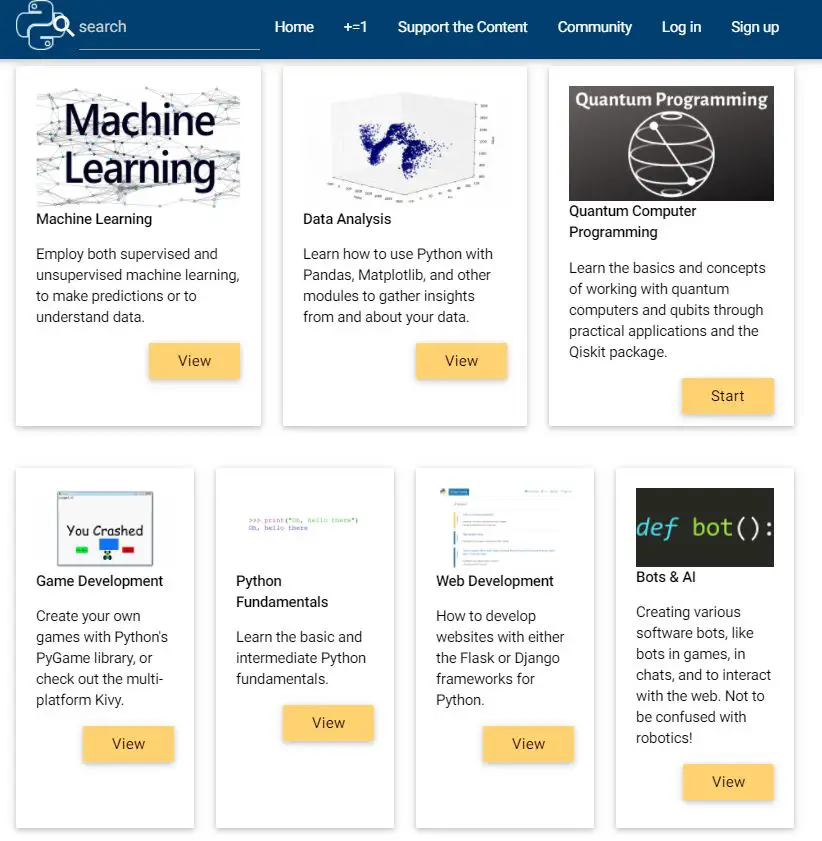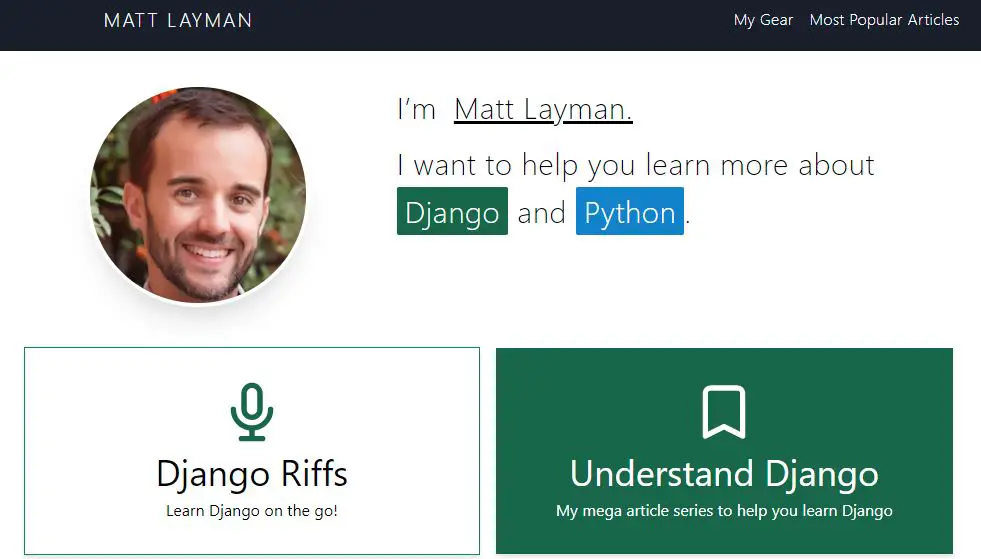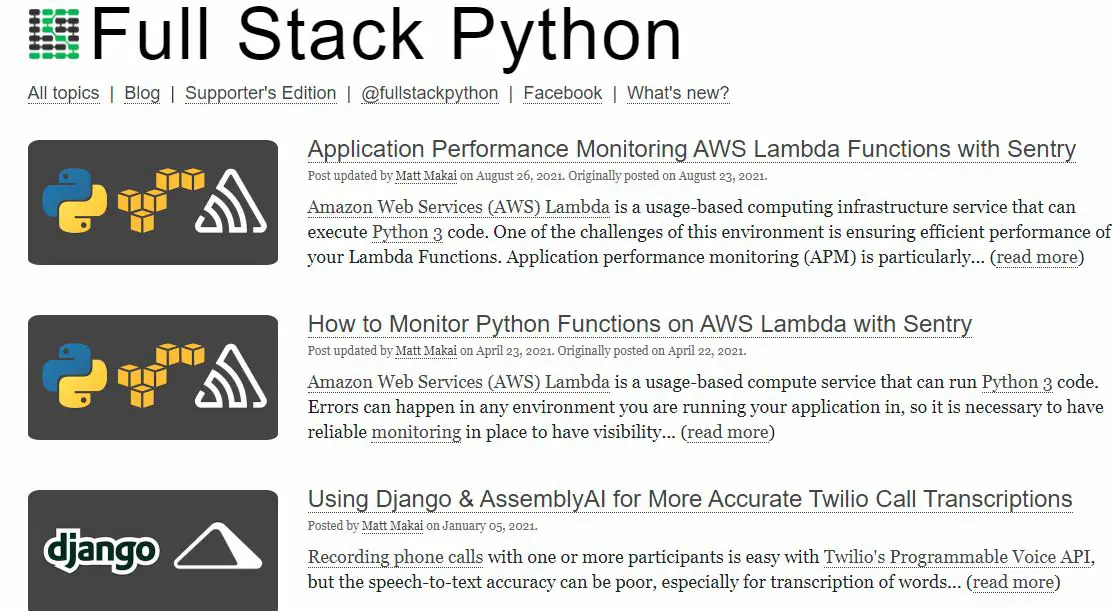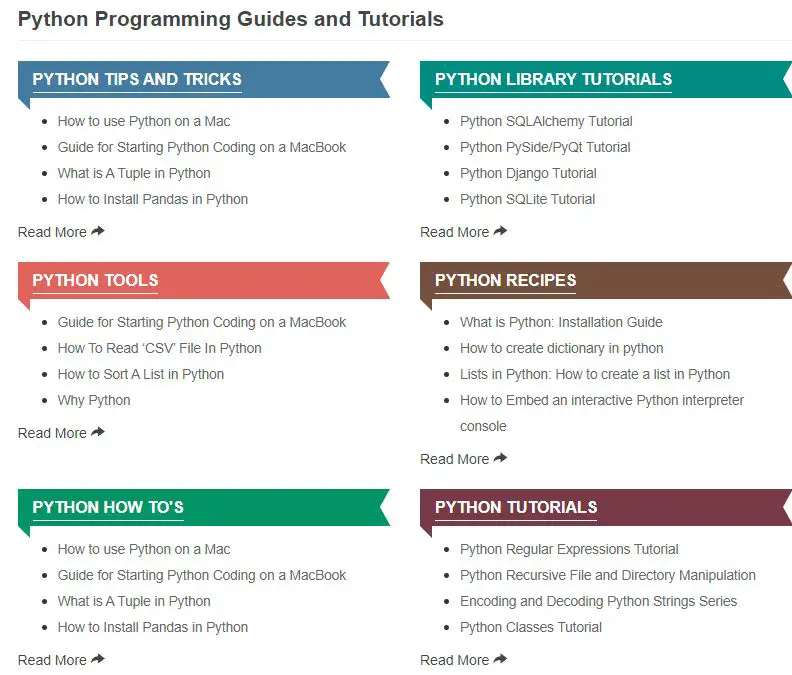Python is one of the most popular programming languages in use today. Therefore, I decided to identify the best Python blogs on the internet, which I eventually succeeded in doing.
These websites each display technological expertise, are generally simple to navigate, publish information consistently and have withstood the test of time.
Throughout this procedure, I applied the same methodology to each blog to identify and compare common characteristics (or flaws).
It was important to me to evaluate the depth of each blog’s technical information as well as the utility of the content. Several postings were read from beginning to end for me to obtain a sense of the writing quality and comprehensibility.
It was important to me to determine how frequently each blog published new content, and I researched how long each site had been in operation. The following are the python programming blogs that I discovered:
Best Python Blogs To Follow To Stay Updated 👌
1. Python Programming
Pythonprogramming.net is a content hub that contains multi-level lessons of varying skill levels that cover a wide range of prominent Python use cases, including Machine Learning, Web Development, Bots and Artificial Intelligence, Finance, and Quantum Computing, among others.
Although the publishing strategy is centered on tutorials, once you begin reading a lesson, you will discover that the technical subject is beautifully presented, with plenty of depth and supporting evidence.
The writing is not bad compared to some of the blogs; it is just not particularly good. Some important links are present; however, they are not always in the locations you would expect them to be.
2. Matt Layman
Matt Layman is the name of a self-titled personal blog with text, audio, and video entries that demonstrate beneficial approaches, strategies, tutorials, and other useful information.
The writing quality is above average, clean, and simple, with few typos and well-organized examples that enhance the blog’s message without being overly promotional.
The blog’s message is reinforced by the examples, which are well-organized and well-written.
Followers might expect a few irregular monthly postings from this impressively active account that has been around since 2008. Matt Layman remains one of the most engaging python blogs
3. PyImageSearch
PyImageSearch is a small but active community centered on developing computer vision, deep learning, and OpenCV algorithms and frameworks.
Beginning in 2014, you will be met with weekly blog pieces that provide expertise from beginner to advanced competency levels.
This is one of the blogs with crisp, sharp, and informative content, and there is no unnecessary filler text or graphics, but be prepared to see many promotional links in the body of the text.
4. Real Python
Real Python is a learning platform with a big database of blog posts, tutorials, books, and courses to help you learn Python. The content is varied in terms of difficulty level and technical objective.
While some of the books and courses are exclusively accessible for purchase, a wealth of useful knowledge from 2013 to the present is made available to developers of all backgrounds without charge.
Writers may expect several new blog entries every month that are clear, well-researched, and tastefully formatted, and readers can look forward to several new blog pieces every month. Very few blogs have such a large database as Real Python
4. r/Python
In addition to other programming languages, Reddit hosts a large crowd-sourced message board with a “subreddit” dedicated to Python, among other things.
Since its inception in 2008, “r/Python” has grown to include a big community of users (>500K) with a wide range of programming skills that contribute dozens of queries, solutions, and ideas daily.
As with certain message boards, there are no sub-categories or sub-subreddits, meaning all posts are consolidated in a single place.
However, because all postings are subjective and produced purely by other Reddit users, they do not always match the standards of readability, clarity, and even language proficiency expected of them.
5. Practical Business Python
Business Management in the Real World Python (Visit Here) is a Python blog that covers a wide range of technical topics relevant to the Python programming language, focusing on commercial use cases and operability rather than podcasts or interviews.
Detailed technical expertise is demonstrated in the articles, which are accompanied by relevant screenshots. Most posts are more functional than fluid, although they are not devoid of references or appropriately supporting hyperlinks to other resources.
Subscribers can expect 1-2 new postings intermittently throughout the month, but they can keep themselves interested while they wait by browsing the archive of stories dating back to 2014.
6. Ned Batchelder
Ned Batchelder is the personal blog of experienced Python programmer Ned Batchelder, and it is one of the earliest and oldest active blogs, dating back to the early 2000s.
There is a plethora of literature dating back over two decades, with some issues requiring lengthy study and others only simple one-paragraph recommendations.
Ned’s material is simple and free of unnecessary features. Blog posts are brief enough to communicate the desired content while maintaining a professional appearance.
The only thing I can recommend is that you publish more often; at the moment, you’re fortunate if you receive one per month at most.
Unfortunately, there is a huge backlog of blogs to examine, each written by a programmer who has spent more time playing with and writing Python than the typical programmer.
7. Full Stack Python
Full Stack, in its entirety Python, is a blog written and maintained by the author for Python developers and would-be Python developers.
Posts blend original content and automatically gather content from other media. The blog has been in operation since 2012.
Most articles are about technological discoveries, explanations, tutorials, and other things.
In-depth material, a wide spectrum of technical expertise, and a clear and straightforward voice are all characteristics of this blog’s content, which raises no major red flags.
Unfortunately, fresh content is uploaded in unpredictable and seemingly random bursts, making it difficult to keep up with. This is one of its downsides compared to other blogs.
8. Pyfound
Founded in 2011, PyFound provided official development updates, industry conferences, and project schedules 2011. PyFound is the official blog of the Python Foundation.
However, while the blog is educational and contains useful links, its primary focus is on disseminating information about the organization’s development status and local activities.
The technical subject matter is extensively studied, and the writing style is straightforward, concise, and free of errors, as you will see if you read through the event and fundraising update emails and posts.
New posts are irregular, but you can expect an average of between one and five new ones per month. Like Full Stack Python, Profound also has this disadvantage compared to other blogs.
9. Finxter
Finxter is a Python instructional site that includes everything from beginner tutorials to intermediate puzzles to in-depth technical guides and challenges.
Finxter is a great place to learn Python. Since 2012, Finxter has featured regular updates every month on its website.
The writing is good but not spectacular, and there is little space for language improvement. Finxter’s content quality, like many technical blogs, is enhanced by including helpful links and relevant references.
10. The Mouse vs. the Python
This is a personal blog (Visit Here) in which the author publishes content on various themes in both written and video media.
One-on-one interviews with developers appear to be a frequent post type, albeit these may be less valuable to current programmers than tutorials and technical breakdowns, which are more useful to them. This is one of the most interesting python blogs.
The technical depth is not below average, as both forms offer moderate skill and value.
The blog has been active since 2008 and has established itself as a dependable content publisher, with users receiving 5-15 new items every month consistently. The text in Mouse vs. Python is straightforward and clear enough to be understood.
While exploring Best Python Blogs for our readers, we found an awesome video on Python Tutorial for Beginners – Learn Python in 5 Hours [FULL COURSE]. it’s a long video but trust me it’s beneficial.
11. Doug Hellman
A variety of entries are featured on Doug Hellman’s technical blog, ranging from short patches to in-depth analyses of approaches.
Some people may find the subject matter valuable. However, it is hit or miss depending on whether your goal is information or function.
The posts, which date back to 2006, indicate sufficient working proficiency and an awareness of existing and new upgrades related to currently running programs.
The content, which is normally at least 1-2 infrequent articles per month, is clear and to the point, and it includes dependable in-text links to supporting documentation.
12. PyBloggers
This blog is a central location for Python programmers, and it gathers RSS feeds from other blogs and refreshes them whenever a new article is published.
Tutorials, walkthroughs, introductions, and project ideas for developers are among the topics covered in the articles.
In addition to pulling quality articles that demonstrate great technical knowledge and thorough step-by-step tutorials from other sources, PyBloggers also curates information from other sources.
Readers will appreciate content written in fluent and polished language appropriate for the discussed subject matter.
Even though the blog has been around since 2007, it has not been updated since 2019. This makes it one of the oldest blogs on our list.
13. PyCharm
PyCharm is the blog arm of JetBrains’ integrated development environment for Python programming, which is also known as PyCharm.
From product updates to articles, tutorials, webinars, and interviews, PyCharm has published a couple of new monthly posts for the past many years without missing a beat.
While there is a significant amount of company marketing and sales promotion, there is also a substantial amount of informative information.
Even explicit sales pitches include allusions to Python foundations, user guides, and an overview of programming ideas required to use the product.
Because most of the entries are largely video/audio recordings or short-form text, there is not much writing to grade in this category.
Nonetheless, there are no obvious flaws or inconsistencies in what is presented, and numerous supporting connections.
14. STX Next
STX Next is the brand-name programming blog of a European software development firm with a global presence.
Most of the articles are general ‘How to’s or ‘Average Salaries,’ with company promotions interspersed throughout.
Developers may be dissatisfied with this. At the same time, many of the articles are not technical; the ones appear to have been written by software developers with a strong technical understanding of Python.
Each article demonstrates a command of the English language and grammar and a wealth of supporting links and references.
15. Invent with Python
Invent with Python is a blog about educational programming written by Al Sweigart, a Python veteran and instructor passionate about teaching others.
The blog’s foundation is built on providing free tools, guidelines, courses, and tutorials to assist beginners in their programming study.
Any developer who views this site will likely find it informative, fascinating, or an interesting blend of the two. You will find technical articles with a few hobby projects and layman-word explanations.
However, the site has been operating since 2009 and would be more useful if it were updated more frequently (there have only been 1-2 new articles in 2020).
16. Python Tips / Yasoob.me
Python Tips is a personal blog focusing on the technical applications and intricacies of the Python programming language.
You will find a wide collection of articles, guides, explanations, and deep dives, which will be valuable to most Python programmers who visit this website.
Yasoob, the blog’s sole writer since 2013, demonstrates a good technical command of the whats, wheres, whens, whys, and hows to guide the reader through complex subjects in a straightforward and detailed manner.
Its usefulness is hampered by times of irregular posting, followed by periods of stillness of 2-3 months or more.
The posts, like many technical blogs, are instructive and jam-packed with data and supporting links, but they also read like many technical blogs: substance takes precedence over presentation.
We would recommend other less technical python blogs for beginners.
17. Simple is Better Than Complex
Simple is Better Than Complex is Vitor Freitas’ programming blog, which he maintains on his website.
It is possible to discover articles, videos, and tutorials that Python developers would find useful, but there is no large archive to search through.
The blogs contain detailed solutions, and the writing’s simplicity helps to make up for the mistakes and run-on sentences that appear from time to time.
18. Python Central
Python Central is a resource for learning Python programming that offers a diverse selection of categories.
For beginning or intermediate programmers, the videos and tutorials are excellent resources; however, for expert developers, they are lacking in depth.
While the articles contain useful (if sometimes tedious) examples, the odd typographical errors can be irritating and should be avoided.
Even though the site has not been updated since 2019, there is valuable information dating back to 2012 for anyone interested in learning the fundamentals.
19. Python Guru
It is a multi-dimensional programming resource that includes backend developer tutorials and online content’ listicles.’ compared to other blogs, Python Guru is a newer blog still in its early stages, launching in 2019.
Although no publication schedule has been established, new entries are frequently published more than once a month, sometimes more than a dozen every month.
There was nothing in the other months. However, while the contributions demonstrate a high level of technical understanding and competence in the subject matter, the grammar may be improved.
20. Kite
When you look at Kite, you will see that it comprises numerous authors’ blog articles that come together to make a diversified collection of themes spanning from beginner to advanced difficulties and applications.
Despite the small number of postings in the archive, the articles are incisive and in-depth technical explanations that many programmers may find valuable.
Most posts are well-written and well-organized, with only a few small flaws. Kite was founded in 2018 and has been updated every month since then, but it has not been updated since 2019.
21. SkillSoft
SkillSoft is a learning management system and content development firm specializing in educational software. Python-related subjects on the site have only been discussed for a few years.
But because it has been operating since the late 1990s, you can access more relevant television content from a more recent period. Still, do not hold your breath for any regularity in posting fresh content.
As a blog from a well-established technology company, it should come as no surprise that the writing quality is outstanding and that the site promotes the company only sporadically.
Posts provide valuable content with a great deal of insight from a technical aspect.
While SkillSoft does not post nearly as much information as other blogs, the pieces that appear are up-to-date, informative, and useful in their application.
22. Planet Python
In addition to Planet Python, several other blogs automatically aggregate content about Python from other sources.
The vast index of externally-linked blogs and developer repositories on the left-hand side of the page is its most important resource.
Despite the vast range of positions, technical expertise can be counted upon. When comparing blogs, there is a significant difference in writing quality, with some pieces feeling more like personal blogs and others feeling more like instructional resources.
23. Coding for Entrepreneurs
Coding for Entrepreneurs is a self-educational course and project blog that teaches newcomers how to code from the ground up in a collaborative environment (Python, among other languages).
The content is fairly extensive in the courses and the projects and provides step-by-step instructions.
While fresh entries are infrequent and sometimes come in rapid succession in clusters, the blog has been known to go into long periods of inactivity. Fortunately, there is a treasure mine of courses and projects that date back to 2016 to keep you occupied while you wait.
The literary style of the blog varies depending on the author; some pieces are excellent, while others are less so.
24. Planet SciPy
Planet SciPy is a blog aggregator for Python-based computing that is free and open-source. A variety of essays, experiments, “week in review” newsletters, conference announcements, patch releases, and the occasional brand promotion can be found on the site.
Even though it was only launched a year ago, you will discover many posts per week (aggregated from various publishers, some of which may not be Python-specific).
The writing quality varies, although entries are generally easy to read and include few errors on average.
25. PyDanny
PyDanny is the personal blog of Daniel Feldroy, a seasoned Python programmer. Since 2012, he has provided analysis of programming subjects and personal comments on this blog.
The content is straightforward, consisting primarily of straightforward language and a few links that are more promotional than supportive of the topic matter.
The blog has been established for about a decade and publishes 1-2 entries per month on average, except for a month or two where there is no activity. This makes PyDanny one of the top python blogs we recommend.
26. Effbot
Effbot is an early 2000s minimalist blog with hundreds of posts about Python and related technologies. It’s still going strong today. You’ll be happy you found this extensive resource, which contains overviews, courses, libraries, and articles covering all levels of competence and unique user applications.
Effbot’s publications include in-depth descriptions and straightforward explanations of advanced technical problems and methods; the overview and examples are neat and well-organized, even though the material is mainly technical.
📚FAQ
Is 40- 50 too old to learn Python?
No, learning Python at a 40- to 50-year-old age is not too late. Though it can be difficult, picking up a new skill or language at any age is a great way to keep your mind engaged and busy.
Python is a well-liked and adaptable programming language in various fields, such as web development, data analysis, and machine learning.
Regardless of your age or level of experience, you may learn Python using various online and offline tools. Start by enrolling in an online course or lesson, going to a local workshop, or enrolling in a class.
Python is an excellent approach to learning the language in an organized and encouraging setting. Many colleges and universities also offer courses in the language.
Learning Python or any other skill is never too late. So don’t allow your age to stop you from learning the language if that’s what you want to do. Try it out and see where it leads you!
Is 3 months enough for Python?
It is impossible to answer whether three months is enough time to learn Python because it relies on many different things, including your existing programming knowledge and experience, how much time you have to devote to learning the language, and your ambitions.
In general, three months is a good time to become familiar with the fundamentals of Python and begin working on simple projects.
It can take you more than three months to become an expert in Python and be able to use it for challenging jobs, though.
Your studies must be committed to and disciplined if you wish to master Python in three months.
At least a couple of hours should be spent each day on language acquisition and practice. If necessary, you should also look for additional help and resources.
You can achieve a lot in three months with perseverance and hard work.
Who is the best Youtuber for Python?
Finding the top Python YouTuber can be challenging because so many of them exist.
Popular Python YouTubers include Sentdex, who covers a wide range of Python and data science topics, and Corey Schafer, who produces lessons and videos on Python programming. The Net Ninja, Traversy Media, and Derek Banas are well-known Python YouTubers.
Finding a YouTuber to learn Python from who has a teaching style that suits you and offers the knowledge and encouragement you require is crucial.
The quality, depth, experience, and Python proficiency of their content should also be considered.
Your needs and preferred learning method will determine the best Python YouTuber. It’s worthwhile to check out a few YouTubers to determine who you prefer.
Conclusion
This brings us to the end of our list of the best Python blogs available. Regardless of your level of python competence, the blogs have something to offer. You would be able to discover one that meets your requirements.
As always, I am curious to know what blogs you have explored. Please leave this in the comments and your feedback on these blogs.






























